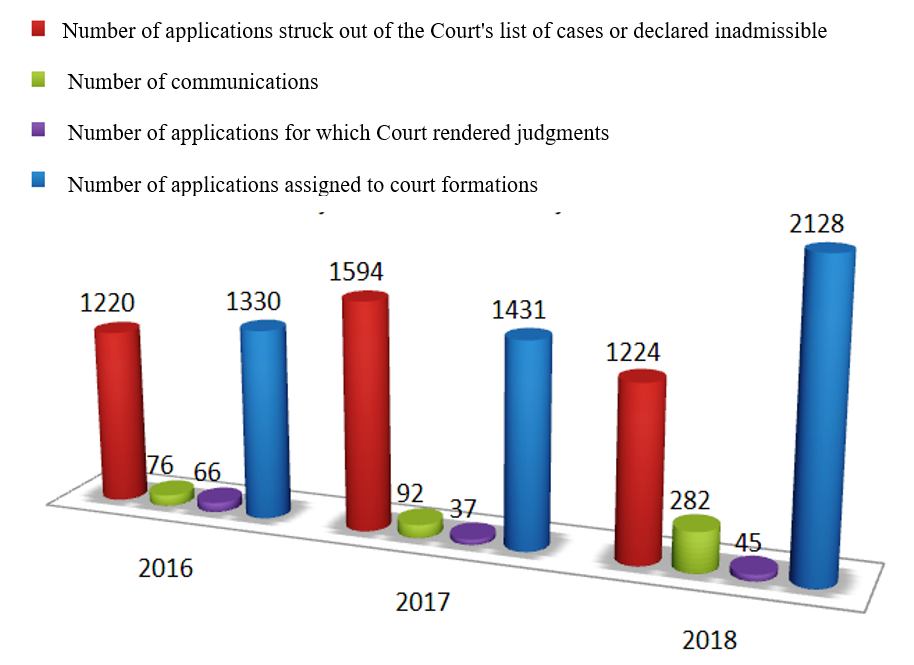Case law of the European Court of Human Rights in relation to Serbia for 2018
The Republic of Serbia ratified the European Convention for the Protection of Human Rights and Fundamental Freedoms on March 3, 2004. From the moment of ratification, any person, non-governmental organisation or group of individuals, who claim that their rights have been violated by the actions of the Republic of Serbia, can submit an application to the European Court of Human Rights. It is necessary that the applicant, in accordance with Rule 47 of the Rules of the Court, correctly fill out the application form, otherwise, the Court will not consider their complaint. After the Court verifies that the application contains all the necessary information, it will be forwarded to one of the court formations. Whether it will be assigned to a single judge, committee or council will depend solely on the type of case.

Statistically speaking, in 2018, the ECHR assigned to various judicial formations a total of 2,128 applications submitted against the Republic of Serbia. Out of that number, 1,224 applications were struck out of the Court’s list of cases or declared inadmissible. The application will be struck out if the applicant does not respond to the Court’s requests within the prescribed time limit, as it will be deemed to have withdrawn from the proceeding. Also, those applications for which a friendly settlement has been reached or a unilateral declaration has been made by the state will be struckout. On the other hand, the inadmissibility of the application will be appreciated on the basis of the criteria prescribed in Article 35 of the Convention. If the application is not struck out of the list of cases or declared inadmissible, a further course of proceedings entails, inter alia, communication with the competent authority of the State against which the application was filed.

Statistically speaking, in 2018, the ECHR assigned to various judicial formations a total of 2,128 applications submitted against the Republic of Serbia. Out of that number, 1,224 applications were struck out of the Court’s list of cases or declared inadmissible. The application will be struck out if the applicant does not respond to the Court’s requests within the prescribed time limit, as it will be deemed to have withdrawn from the proceeding. Also, those applications for which a friendly settlement has been reached or a unilateral declaration has been made by the state will be struckout. On the other hand, the inadmissibility of the application will be appreciated on the basis of the criteria prescribed in Article 35 of the Convention. If the application is not struck out of the list of cases or declared inadmissible, a further course of proceedings entails, inter alia, communication with the competent authority of the State against which the application was filed.
During 2018, communication with the Government of the Republic of Serbia was carried out in connection with 282 applications filed. This is a considerable increase in the number of communications compared to 2017, in which such communications were made in relation to 92 applications. This trend is generally noted in the Court’s treatment of all the member states in 2018, but with an overall increase of only 6%, while in relation to Serbia it amounts to as much as 300%.
Judgments of the Court in relation to the Republic of Serbia
For the remaining 45 applications, consolidated in 13 cases, the Court rendered judgments concerning both the merits and the amount of just satisfaction awarded to the applicant. The only judgment in which the Court held that there was no violation of the right which the applicant claimed to have occurred was rendered on 28 August 2018 in the case of Grujić v. Serbia. Namely, the applicant claimed that domestic authorities had failed to apply the domestic law in a way which could have effectively secured his contact rights (Article 8 of the Convention) because they did not take effective steps to enforce the interim measure determining the dynamics of keeping the applicant’s personal relationships with his children in the period following divorce from his wife. In paragraph 74 of its judgment, the Court emphasized in particular that “the State’s obligations in relation to Article 8 are not of result but are of means”, taking the view that the authorities of the Republic of Serbia acted in a correct by taking all the necessary measures. However, this decision was not adopted unanimously because of the dissenting opinion of Judge Georgios Serghides, wherein he referred to the judgment rendered in the case of Zdravković v. Serbia. The judge has based his opinion on the argument that the inactivity of domestic authorities, which lasted about a year and a half, was a very long period which, as a rule, could have irreparable consequences for the relationship between the parents and the child, resulting in a violation of Article 8 of the Convention.
In the remaining 12 cases in which the Court found the violation of right, the applicants referred to a violation of Article 6 of the Convention providing for the right to a fair trial. These judgments can be classified into three categories based on the type of domestic procedure in which the violation occurred, and three sub-categories, evaluating the type of violation of rights within these procedures. In this regard, the violation of the right to a trial within a reasonable time, a fair hearing and access to a court within the administrative, civil and enforcement proceedings may be distinguished. Thus, in relation to Serbia, in the course of 2018, the Court rendered only one judgment on the violation of the right to a trial within a reasonable time in the administrative procedure, while for the same violation within the framework of the civil procedure the Court delivered four judgments. As regards violations of the right to a fair hearing in civil proceedings, the Court rendered two judgments, while it found that access to a court within the same type of proceedings was precluded in one case. On the other hand, the violation of Article 6 of the Convention in the enforcement proceedings before the domestic courts occurred in only one case, in which it was found that the right to a trial within a reasonable time had been violated.

According to the classification, the case of Hrustic and Others v. Serbia would belong to the first category, in which all the applicants complained about the excessive duration of the domestic administrative or civil proceedings. The average length of proceedings per applicant was 6.77 years counting from the date of ratification of the Convention. Taking into account all the facts, the Court rendered a judgment stating that the length of the proceedings in question did not meet the requirement of a reasonable time. The excessive length of civil proceedings was also cited by the applicants in the following cases: Šaćirović and Others v. Serbia, Ćorić v. Serbia, Ilić v. Serbia and Stanivuković and Others v. Serbia. In all of the cases, despite the opposition of the RS Government, the Court decided on the composition of the three-member committee. He found that the length of domestic proceedings was incompatible with the complexity of the case, the conduct of the applicants and the competent authorities, as well as the relevance of the dispute to the applicants. However, the duration of the civil proceedings was not the only reason the applicants were summoned. Namely, in Mirković and Others v. Serbia and Grbić v. Serbia, a total of 14 applicants complained of a violation of the right to legal certainty, bearing in mind that the domestic courts rejected their claims, while at the same time identical requests were received, that the decisions of the domestic authorities were arbitrary and did not have adequate explanations. According to the legal classification of the Court, these grounds are undermined by a violation of the right to a fair hearing, which, apart from the three applicants, was violated by the conduct of domestic judicial authorities. Regarding the violation of the right to access to the domestic court, the applicant in the case of Ljajić v. Serbia cited a failure by the state to enforce a final court decision that was made in his favor. Bearing in mind that the decision had not been enforced even at the time when the Court was deciding on it, a judgment was issued stating that there had been a violation of Article 6 of the Convention. In the case of Knezevic and others. v. Serbia, the Court dealt with the length of the administrative proceedings before domestic bodies, the issue of adequacy of the amount of compensation for non-pecuniary damage that the domestic courts awarded to the applicants upon establishing that their right to a trial within a reasonable time had been violated. The Court confirmed that the enforcement with a delay of five to seven years did not meet the requirement of a trial within a reasonable time, and also noted that the awarded compensation did not amount to adequate satisfaction, wherefore it awarded the applicants significantly higher amounts. Bearing in mind that all the judgments were passed on the violation of the right to a fair trial, one could conclude that the Republic of Serbia, in the protection of human rights, has the greatest problem in the area of the efficient functioning of the judiciary. This is not good news in general and especially given the fact that the EU accession negotiations involve enhanced activities under Chapter 23 relating to judicial reform, anti-corruption policy, fundamental rights, and EU citizens’ rights.

Citizens awareness of this fact was checked through a survey on our site. We asked the readers whether they would agree with a proposition that citizens of the Republic of Serbia can effectively exercise and protect their rights before domestic courts. Respondents were able to choose one of the five answers offered, which ranged from extremely positive to extremely negative attitudes. Out of the total number, 65.22% of the respondents considered that citizens generally cannot effectively protect their rights, while 21.74% considered the courts to be ineffective. On the other hand, 8.70% of the respondents considered that court protection was mostly effective, while 4.34% had no opinion on this issue. Based on these data, we conclude that the attitudes of citizens largely coincide with the jurisprudence of the European Court of Human Rights.
Besides the judgments, the Court may issue its acts in the form of a decision where it assesses that the application submitted is unacceptable or should be struck out of the list of cases. In 2018, the Court made decisions concerning 145 applications that were consolidated in 37 cases. A total of 7 cases failed to meet some of the admissibility criteria, while 30 were struck out of the list.
Resolutions adopted by the Committee of Ministers
In 2018, the Committee of Ministers of the Council of Europe, in relation to Serbia, passed 25 resolutions pertaining to 130 resolved cases concerning the 261 applications filed. In 16 cases, the resolutions concerned the information provided by the Serbian Government on the measures taken to prevent new violations and the payment of the awarded compensation in 8 cases they dealt with the payment of the amounts provided for in the friendly agreement, while in Resolution CM/ResDH (2018) 470, the case of Zorica Jovanovic v. Serbia, the respondent State was called upon to take measures of a general character. Namely, the Committee of Ministers recalled that the verdict, in this case, became valid on September 9, 2013. The verdict confirmed that the right to respect the applicant’s family life was violated because the respondent State did not provide reliable information about the fate of a son who had died in the maternity hospital in 1983, allegedly three days after his birth.
The general character of the measure lies in the fact that there is a significant number of potential applicants due to the case of “missing babies”, which should be solved through lex specialis, as a legislative mechanism that would allow for the indemnification of parents is not yet established. There is great concern regarding this issue, having in mind the fact that despite the previous reactions of the Committee of Ministers in the form of the provisional resolution of September 2017, the authorities in Serbia have not yet established a mechanism for protection.

Duration of the proceedings

As regards the average duration of the proceedings before the European Court of Human Rights, it amounts to3.33 years in respect of the applications against the Republic of Serbia, and to 3.30 years in respect of the relevant decisions. On the other hand, the average length of the proceedings before the domestic authorities against which the applications were lodged and in respect of which the European Court of Human Rights rendered the judgment amounts to 7.84 years, or 7.71 years, for the proceedings based on which the decision was made.
Translation and publication of judgments
The obligation of informing citizens of the contents of the judgments of the European Court of Human Rights in the procedures in which the Republic of Serbia is one of the parties is envisaged by the Decree on the Representative of the Republic of Serbia before the European Court of Human Rights. Specifically, Article 6 of the Decree prescribes that these judgments must be translated and published in the “Official Gazette of the Republic of Serbia”. Having in mind this obligation, it can be stated that it has been fully met since all the judgments rendered against Serbia in 2018. were translated and made publicly available on the website of the Ministry of Justice of the Republic of Serbia. On the other hand, out of a total of 37 decisions and 36 resolutions passed, only 6 decisions were translated and published.
How much does an insufficiently efficient system of human rights protection cost the citizens of Serbia?
Finally, this raises a very important question concerning the amount of money the Republic of Serbia has to pay to the applicants for pecuniary and non-pecuniary damages, as well as the costs of the proceedings that are imposed by a judgment or decision of the European Court of Human Rights. According to the Court’s judgments in respect of 45 applications submitted by 56 applicants, the total amount payable by the State amounts to 157,970.00 euros and averages 2,820.90 euros per applicant. Concerning decisions made based on a friendly settlement with the state or its unilateral statements, a total of 41 applicants from 34 applications must be reimbursed a total of 103,110.00 euros, which would mean that each applicant received an average of EUR 2,514.88. The court usually awarded the applicants 2,000 euros for non-pecuniary damage, while they were awarded 500 euros for the costs of the proceedings. The largest amount was awarded in the case of Iseni v. Serbia where the Court awarded the applicant a sum of 56,000.00 euros for pecuniary damage and 4,000.00 euros for non-pecuniary damage. The Court noted in particular that the amounts imposed would be reduced by all amounts previously paid by the state. However, if the state fails to fulfill its obligation within three months, it will have to pay interest on the imposed amounts at a rate equal to the marginal interest rate of the European Central Bank during a period of default plus three percentage points. In summary, in 2018 the insufficiently functional judiciary cost the Republic of Serbia and its citizens a total of 261,080.00 euros, which will be paid from the budget.
You can find a list of all judgments, decisions, communications, and resolutions as well as a statistical data representation that we have collected for this analysis by clicking on this link.
Suggested Citation for Analysis: Andrijana Bakračević, European Court of Human Rights Practice in Serbia in 2018, Student Analysis, 11.2.2019. https://www.internationallawwatch.org/en/case-law-of-the-european-court-of-human-rights-in-relation-to-serbia-for-2018/
Suggested Citation for Statistics: Andrijana Bakračević, Statistics of the case-law of the European Court of Human Rights in relation to Serbia for 2018, Statistics, 11/02/2019.https://www.internationallawwatch.org/wp-content/uploads/2019/08/Statistika-prakse-Evropskog-suda-za-ljudska-prava-u-odnosu-na-Srbiju-za-2018.-godinu.pdf
